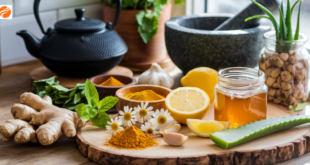
Your immune system is your body’s natural defense mechanism against infections, viruses, and other harmful invaders. A strong and balanced immune system is crucial for maintaining health and preventing illness. However, everyday stress, poor diet, and lack of sleep can weaken your immune defenses, making you more susceptible to infections. Fortunately, there are simple yet effective strategies you can incorporate into your daily routine to naturally enhance your immune system. In this blog, we’ll explore the best ways to boost your immune system naturally, focusing on lifestyle changes, nutrition, and self-care.
Table of Contents
Understanding the Immune System
The immune system is a complex network of cells, tissues, and organs that work together to protect the body from harmful pathogens such as bacteria, viruses, and parasites. It includes specialized cells like white blood cells (lymphocytes) and antibodies that target and neutralize invaders. A well-functioning immune system can quickly detect and respond to threats, preventing illness and promoting overall well-being. However, your immune system can be influenced by various factors, including your diet, stress levels, physical activity, and sleep habits.
1. Prioritize a Balanced Diet Rich in Nutrients
One of the best ways to boost your immune system naturally is by fueling your body with the right nutrients. A well-balanced diet that includes a variety of fruits, vegetables, whole grains, and lean proteins provides the vitamins and minerals your immune system needs to function optimally.
How it Helps:
- Vitamin C: Known for its immune-boosting properties, vitamin C helps stimulate the production of white blood cells. Citrus fruits, bell peppers, and leafy greens are excellent sources of vitamin C.
- Vitamin D: This vitamin plays a crucial role in immune function and can be obtained from sunlight, fatty fish, and fortified foods.
- Zinc: Zinc is essential for immune cell function and can be found in foods like nuts, seeds, legumes, and shellfish.
- Antioxidants: Found in berries, nuts, and dark leafy greens, antioxidants help protect the immune system by neutralizing free radicals, which can damage cells.
Key Foods to Include:
- Citrus fruits (oranges, lemons, grapefruits)
- Leafy greens (spinach, kale)
- Berries (blueberries, strawberries)
- Nuts and seeds (almonds, sunflower seeds)
- Fish rich in omega-3s (salmon, mackerel)
2. Stay Active with Regular Exercise
Physical activity is another natural way to boost your immune system. Regular exercise helps improve circulation, allowing immune cells and other substances to move freely through the body and do their job efficiently. While intense or prolonged exercise can suppress the immune system, moderate exercise is beneficial for maintaining overall immune health.
How it Helps:
- Exercise promotes healthy circulation, allowing immune cells to detect and respond to threats more effectively.
- Physical activity reduces inflammation and lowers the risk of chronic diseases that can weaken immune function.
- It can also reduce stress hormones, which are known to suppress immunity.
Suggested Activities:
- 30 minutes of moderate exercise (walking, cycling, swimming) most days of the week.
- Activities like yoga or tai chi, which combine movement with mindfulness, can help reduce stress and enhance immunity.
3. Get Quality Sleep to Support Immune Health
Sleep is one of the most critical factors for maintaining a healthy immune system. During sleep, your body repairs and regenerates itself, producing key immune cells such as cytokines that help fight infection and inflammation. Without adequate sleep, your immune system’s ability to function properly is compromised, making you more vulnerable to illness.
How it Helps:
- Adequate sleep helps produce immune cells that fight off infections and inflammation.
- Sleep deprivation can lower the production of protective cytokines and antibodies, weakening your immune response.
- It also helps regulate stress hormones like cortisol, which, when elevated, can suppress immune function.
Tips for Better Sleep:
- Aim for 7-9 hours of quality sleep each night.
- Create a calming bedtime routine by limiting screen time and engaging in relaxing activities like reading or meditation.
- Maintain a consistent sleep schedule by going to bed and waking up at the same time every day.
4. Manage Stress to Protect Your Immune System
Chronic stress can weaken the immune system, making it harder for your body to fight off infections. Stress triggers the release of cortisol, a hormone that suppresses the immune system and increases inflammation in the body. Learning how to manage and reduce stress is essential for maintaining a strong immune system.
How it Helps:
- Reducing stress can lower cortisol levels, which can have a direct positive impact on immune function.
- Stress management techniques like mindfulness, meditation, and deep breathing can help balance the body’s immune response.
Stress-Relief Techniques:
- Mindfulness meditation: Focus on your breathing and stay present in the moment to reduce anxious thoughts and calm the mind.
- Yoga and stretching: Gentle movement combined with deep breathing can help release tension and lower stress hormones.
- Social connection: Maintaining strong relationships and staying socially connected can help buffer the effects of stress and boost your mood.
5. Stay Hydrated to Keep Your Immune System Functioning
Water is essential for the optimal functioning of every system in your body, including the immune system. Proper hydration ensures that your body’s cells function efficiently and helps flush out toxins and other waste products that could weaken your immune response.
How it Helps:
- Hydration supports the production of lymph, a fluid that carries immune cells throughout your body.
- Staying hydrated helps flush toxins from the body and supports the proper function of the organs that play a role in immunity, like the kidneys.
Hydration Tips:
- Drink at least 8 glasses (64 ounces) of water per day.
- Consume fluids in the form of herbal teas, broth-based soups, and water-rich fruits and vegetables (such as cucumbers and watermelon).
6. Supplement Wisely to Fill Nutritional Gaps
While it’s best to get nutrients from whole foods, some people may benefit from taking supplements to fill in nutritional gaps that could weaken their immune system. Popular immune-boosting supplements include vitamin D, vitamin C, zinc, and probiotics.
How it Helps:
- Vitamin D: Supports immune cell function and reduces the risk of respiratory infections.
- Probiotics: Promotes gut health, which is directly linked to immune function since a significant portion of the immune system resides in the gut.
- Elderberry: Known for its antiviral properties, elderberry supplements can help reduce the severity and duration of colds and flu.
Recommended Supplements:
- A daily multivitamin that includes essential immune-boosting vitamins like C, D, and zinc.
- Probiotic supplements to support gut health.
- Elderberry syrup or capsules for an extra immune boost during cold and flu season.
also read: 10 Best Natural Remedies for Cold and Flu: How to Relieve Symptoms Naturally
Conclusion: Building a Stronger Immune System Naturally
Boosting your immune system doesn’t require expensive products or complicated regimens. By prioritizing a healthy, nutrient-rich diet, getting regular exercise, managing stress, and ensuring quality sleep, you can naturally strengthen your body’s defenses. Additionally, staying hydrated and considering key supplements when necessary can provide added support. These lifestyle changes not only improve immune health but also promote overall wellness, helping you stay resilient against illness.
for more info click here
FAQs
1. Can I boost my immune system quickly?
While there’s no magic solution to boost immunity overnight, consistent healthy habits like eating well, exercising, and getting enough sleep can strengthen your immune system over time.
2. How does stress affect the immune system?
Chronic stress raises cortisol levels, which can suppress immune function, making you more susceptible to illness.
3. Should I take vitamin C supplements to boost my immune system?
Vitamin C can support immune health, but it’s best to get it from food sources. If you’re not meeting your needs through diet, supplements can help fill the gap.
 Health live a Healthy life
Health live a Healthy life








2 comments
Pingback: 8 Best Dermatologist-Recommended Skincare Tips for Healthy, Glowing Skin
Pingback: Top Natural Remedies for Digestive Health: 10 Best Tips for a Healthy Gut